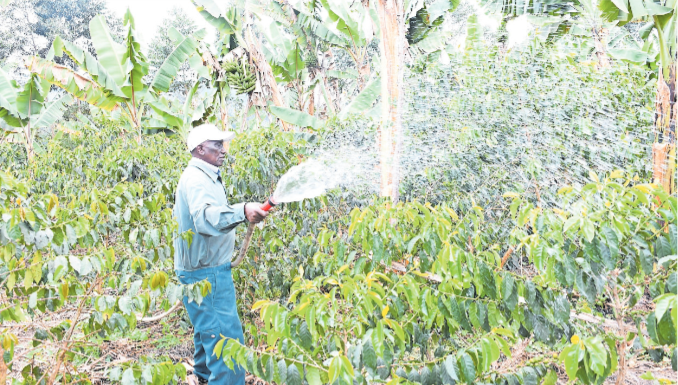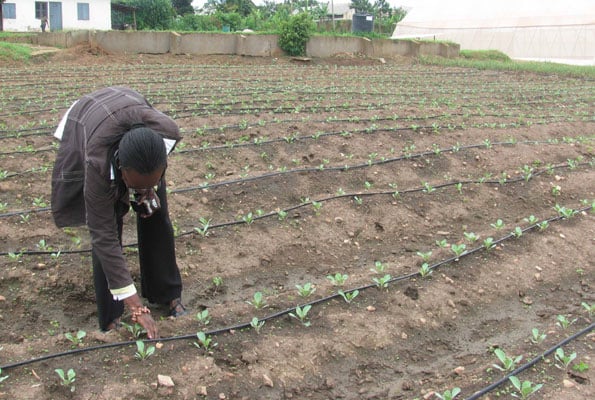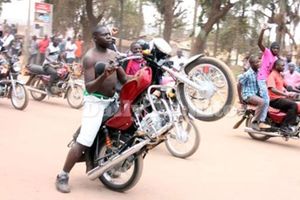Kabale farmers decry stringent rules in govt’s irrigation project

Mr Patrick Bigirwa,one of the beneficiaries of the microscale irrigation project in Kabale District, irrigates his coffee plantation that is intercropped with banana trees and vegetables on October 15, 2024. PHOTO | ROBERT MUHEREZA
What you need to know:
- Under the programme, farmers must contribute 25 percent of funding to the project and provide 2.5 acres of land.
A section of farmers in Kabale District has appealed to the government to revise the conditions put in place before one can access the microscale irrigation project.
The farmers argue that the requirements that farmers must contribute 25 percent of funding to the project and provide 2.5 acres of land leave out many of their disadvantaged colleagues.
The microscale irrigation programme is being implemented by the Department of Agriculture Infrastructure Mechanisation and Water for Agricultural Production in the Ministry of Agriculture as part of the national irrigation policy.
The district vice chairperson, Ms Miria Tugume, on Tuesday, said the co-funding requirement should be reduced to about 10 percent.
The former deputy resident district commissioner, Mr Denis Nzeirwe, said the project should be fully funded by the government and the requirement of 2.5 acres of land revised to allow many farmers to participate since land holding in the area is small.
Mr Patrick Bigirwa, a farmer in Kitumba Sub-county, said while co-funding gives the beneficiaries a sense of ownership, the 25 percent contribution is high.
“I propose this requirement be revised to at least 10 percent so that it can benefit many farmers, especially those that have been operating in wetlands before the government started the programme of restoring them. Timely extension services should be offered to the farmers to ensure that the project objective of promoting food security and other economic gains is fully achieved,” he said.
Other farmers, including Mr Moses Muhwezi, Ms Dianah Kyobutungi and Ms Mauda Tumuheirwe, said those that have been using wetlands as crop gardens should be given first priority in the irrigation project.
“Farmers that have been using wetlands as their crop gardens should be prioritised among the first beneficiaries of this project and no strings such as co-founding should be attached to them because of their vulnerability,” Ms Tumuheirwe said.
However, the district senior agriculture engineer, Mr Paulino Ndyabanoha, insisted that 25 percent co-funding and proof of ownership of land measuring 2.5 acres are set by the World Bank funders.
“Recently, we received 16 applications from farmers interested in this microscale irrigation project for this financial year but only 10 have fulfilled the requirement. These requirements were set by the project funders and as technocrats implementing the project, we have no mandate to change them,” Mr Ndyabanoha said.
One of the project beneficiaries, Mr Patrick Bigirwa, said he expects better harvests from his 2.5-acre garden of mixed crops; coffee, banana, and vegetables after irrigating them through the August-September dry season.
“I fulfilled the requirement of raising Shs5 million before I received irrigation equipment that consists of a 10,000-litre water tank, water pump, pipes, and solar panels. I have no regrets,” Mr Bigirwa said.
A potato farmer, Mr John Mary Karugaba, said the microscale irrigation project will allow farmers to engage in crop production throughout the year.
The Kabale District Production Officer, Mr Beda Mwebeza, said they are set to roll out 17 new microscale irrigation systems in the current financial year, in addition to the 17 others that have already been completed.
“A total of Shs690 million has been allocated for the installation of new microscale irrigation equipment and their design. Seventeen of the expected 34 microscale irrigation projects have been installed and they are doing well,” he said.
He appealed to the farmers to utilise the completed projects for their intended purpose. In the first phase, 11 irrigation schemes costing Shs259.7 million were completed while six that were recently completed cost Shs115.2 million.
Seventeen-irrigation systems worth Shs318 million will be completed during this financial year.
Mr Mwebesa said his department is facing the challenge of lack of extension workers, with one extension worker serving about 1,370 farmers against the government standard ratio of one extension worker per 500 farmers.
The irrigation project
The introduction of the microscale irrigation project came shortly after the government started the restoration of degraded wetlands in the district and promised to give alternative forms of livelihoods to the people that have been using wetlands as crop gardens.
Some of the alternative forms of livelihood include zero grazing, apiary, piggery, and poultry, besides the application of climate-smart technologies such as irrigation, and construction of check dams and terraces to protect their gardens located on hilltops and valleys.




